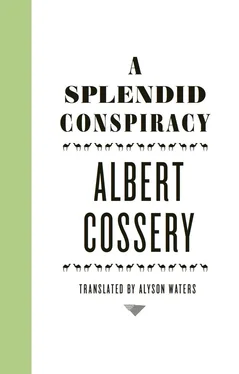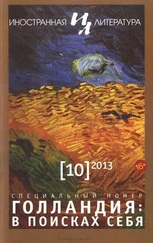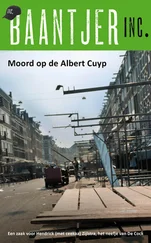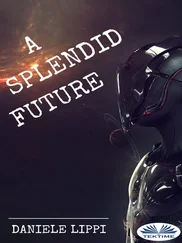Crossing the river on the iron bridge, Medhat caught sight of young Rezk leaning on the parapet, discreetly nibbling something held tightly in his hand. He seemed deep in contemplation of the landscape. Enchanted by this coincidence, Medhat approached the young man, muffling the sound of his footsteps — he wanted to surprise him — then came to a halt next to him. Rezk was finishing up a honey cake; he wiped his fingers with the paper in which the pastry had been wrapped, made it into a ball, and tossed it in the river. Then he turned around and saw Medhat gazing at him with his odd benevolence and a touch of irony.
“What a fortunate encounter!” he said looking Medhat straight in the eye, contrary to his habit. “As God is my witness, I wanted nothing more.”
He seemed exhilarated to be alive, and it was the first time Medhat had ever seen this smiling face on him. He had lost his sickly air, and his still youthful features were bathed with insolent joy.
Medhat was momentarily stunned by the police informant’s new personality; Rezk had hardly accustomed him to such warm relations. Over the course of their various encounters, he had felt a reticence in Rezk, a kind of guilty shyness, and he had always tried to break through the barriers that the young man — for an obvious reason, but one which Medhat found trivial — contrived to erect between them. So what had happened to him? Medhat was honestly intrigued. The veterinary student’s escapade and Salma’s hysterical sniveling seemed trifling compared to the mystery of the surprising transformation of the young police informant. And so the absurd idea of going to look for Samaraï, lost in some disreputable joint, immediately went out of his head. He placed his hand on Rezk’s shoulder, trying to communicate through this touch that he was very sensitive to his signs of friendship.
“I’m so happy to see you Rezk, my brother! Out for a stroll, are you?”
“This is the best time of day. All the shops are closed and the people are taking their siestas. I like to be out walking when no one else is about. I particularly like to linger on this bridge and contemplate the swirling river. There is a lot of poetry in this river, don’t you think? In fact, this city is filled with delightful landscapes. Even its houses, tumbledown and crumbling on the surface, possess a certain charm. But who notices?”
He spoke almost lyrically and his features expressed an entirely new elation. Medhat was dazzled by the flame shooting out of his ordinarily lackluster eyes. His sudden violent love for the eternal splendors of nature astounded Medhat, as if the young man had fathomed a secret of which he, Medhat, had been the sole guardian.
“I do,” he said. “I’ve always noticed. You’re right. There are unsuspected beauties in this city.”
Rezk seemed to hesitate; then he said, with the embarrassment of a young girl confessing her passion to a stranger:
“Do you know that I was thinking of you a while ago?”
“You fill me with honor! May I ask why?”
“Precisely in regard to this city. I know you like it here. You are the only person among my acquaintances who seems to love this city with all his heart. It’s as if you had found an inexhaustible source of joy here. I confess that for a long time this seemed incomprehensible to me. I realize now that I was simply blind.”
“My dear Rezk, not every man is capable of appreciating what is around him. Most men imagine they will find what they are seeking somewhere else, and yet it is right in front of them, laid out under their very eyes.”
“I, too, was like that. But I had an excuse, and I can tell you what it was. It was my hatred of one man that blinded me. This hatred weighed on me like a curse. It took me years to put it out my mind.”
“What do you mean?”
Rezk giggled, as if Medhat must already have known the answer and had merely asked the question to be polite.
“I realized that this man was no more than a buffoon.”
“It took you so many years to figure that out! But all men are buffoons. Bloodthirsty buffoons, but buffoons nonetheless. Well, congratulations.”
So that was the explanation. Medhat did not ask who it was who had deserved such dogged hate. It could be anyone. The majority of humanity was quite obviously hateful to anyone who had once indulged in a belief in mankind. And poor Rezk had believed, inevitably.
“I was sure you would understand.”
“Why were you so sure? You don’t really know anything about me. We’ve never had the chance to talk.”
“You don’t know it, but I am aware of many things that have to do with you. In truth, I have great admiration for you and your friends. I consider you to be the only living beings in this city.”
“Why, then, did you always avoid me? Was I ever disdainful or indifferent to you?”
“Quite the opposite. You have always been remarkably noble. I admit the fault is mine. But I wasn’t avoiding you. It’s just that circumstances were not favorable. And it was a matter of conscience. I was reluctant to commit an act of disloyalty. ”
Now that the mystery of Rezk’s bizarre behavior had been cleared up, Medhat would have liked to urge his companion to be more open, and to take advantage of his confessional mood to force out of him some hint as to the mental state of the police who suspected him and his friends of being dangerous revolutionaries. Rezk was the one who’d been appointed to keep an eye on them and he was aware of almost everything they’d done. Why, then, did Hillali, knowing their innocence, persist in believing they were plotting against the government? This was one of the police chief’s many eccentricities that Medhat had long wanted to comprehend. But he had to act prudently and above all not scare off the young man with questions that were too forthright.
“I don’t see where the disloyalty is,” he said with mischievous simplicity.
“One day I’ll tell you everything, and I hope you will forgive me.”
Rezk’s tone had become serious, and the joyful flame in his eyes had gone out. Medhat took pity on him; he smiled and once again patted him on the shoulder.
“I know everything, Rezk, my brother! And I have nothing to forgive you for.”
Rezk’s countenance showed neither surprise nor the mortifying pallor of someone accused of treason, but rather an air of sweet deliverance, as if at last the mask had fallen and he could now show his true face. With a kind of calm resignation, he said:
“So, you knew. I should have realized it.”
“Yes, I knew you were working for the police. But it doesn’t matter! I also know what a man is reduced to in order to earn his daily bread. Your profession is no different from any other. By whatever means you participate in this despicable world, even by the tiniest job, you inevitably betray someone. We live in a society based on betrayal. That’s why your job as an informant never seemed dishonorable to me. I’ve always liked you.”
“I don’t understand. You knew what I did and yet you did not despise me!”
“One’s got to survive. In any case, you couldn’t harm us. You have too much integrity to tell the police chief nonsense, like an ordinary informant filling his report with unverifiable rubbish in order to make himself look good. You could only tell the truth. With you, we were sure to be able to prove our good behavior. You were in a position to know we weren’t plotting against the government in any way.”
“That’s what I always told the police chief. But he never wanted to believe me. He claimed I was too naïve when I’d say that all you were thinking about was sleeping with girls and having a good time.”
“And this didn’t seem odd to you?”
Читать дальше












